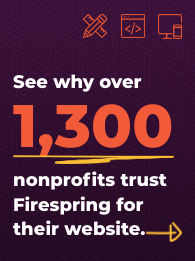“Do we have to register with our state in order to legally fundraise?”
This is a question we get frequently from nonprofits that are either just starting up, starting to grow or simply wondering if their fundraising efforts are legal and on the up-and-up. Our standard answer is usually something like:
“We’re not accountants or attorneys and can’t provide actual legal or financial counsel, but we’d love to direct you to a few resources on that topic.”
Which is true—we’re not and we can’t. And keep reading: We’ll list a few resources at the end. But before we get there, we can provide you with a little more information about what it means to register, along with some of the whys and hows.
Until somewhat recently, most nonprofits (outside the largest ones) that fundraised nationwide mostly ignored state registration requirements. In fact, some experts estimated that as many as 90% of nonprofits failed to register in one or more states even though, technically, state law required them to do so.
Then the IRS stepped in. Form 990 now requires nonprofits to provide information about their state registration—which means, if you’re a nonprofit, you kind of need to pay attention to your state registration requirements in order to complete your annual IRS returns. If you don’t, you could run into problems with Uncle Sam, risk your tax-exempt status and create potential issues with your donors. That all sounds like a big whopping headache.
There’s also this technicality: If you don’t register in a state where you are required to, you’re actually breaking that state’s law, and they could potentially fine or penalize you. For example, if you’re fundraising in Pennsylvania and fail to register, you could end up with a $1,000 fine—plus, the state could shut your fundraising efforts down until you do register.
To make it even more complex, fundraising regulations vary from state to state, and some states don’t require registration at all. To be clear, when we say fundraising, we’re talking about soliciting donations of any type or size, whether it be via your website, Twitter, Facebook, texting, phone calls or old-fashioned snail mail and personal asks.
Because the forms and requirements vary widely between states, we suggest visiting the website of the government agency in your state that regulates fundraising for the most current information on what forms and filings are required.
Ten things about fundraising registration you need to know.
There are probably more than ten, but we narrowed it down to these items of note:
- Where your nonprofit is headquartered actually has nothing to do with whether you need to register in any particular state. Basically, you should register in any state where you actively solicit donations. So if you’re based in California, but you send appeals to donors in New York, you must register in both states. If you actively run a nationwide online fundraising campaign, guess what? You may be required to register in all states that require it.
- Nine states do not require charitable registration: Delaware, Iowa, Idaho, Indiana, Montana, Nebraska, South Dakota, Vermont and Wyoming. Texas has limited registration requirements that apply only to law enforcement, public safety and veterans’ organizations.
- The two main ways to ensure full compliance are to either file a registration (or exemption) in all 41 states that have a registration requirement, or to accept donations only from the states you have registered in.
- Most states have exemptions for educational institutions and churches/religious organizations, as well as membership organizations that only solicit members. Keep in mind, however, you may need to file papers for that exemption.
- Many states require not only initial registration, but ongoing registration fees. Late fees apply, so be sure to pay attention to renewal deadlines.
- Some nonprofits hire the same accountant they use to prepare form 990 to also submit their state’s charitable registration forms—similar information is needed for both.
- Keep in mind that raising money via crowdfunding and giving days can trigger registration requirements in states you may not typically reach. You may be located in just one state, but if you accept donations from multiple states, you need to register in all the states where you receive money.
- To streamline the process, more and more states are moving the registration process entirely online, so while this might sound complicated, it’s getting easier to actually get the job done.
- Many state registration forms require signatures by more than one corporate officer, so note filing deadlines and collect signatures accordingly.
- In addition to registration requirements, several states also require “disclosure statements” that inform potential donors that the nonprofit is registered in the state. These statements must be included in solicitation materials, like appeal letters or direct mail pieces.
This is a lot to pay attention to, especially if you haven’t been. Like we said earlier, we’re neither lawyers or accountants—but we can point you toward these resources that may be more helpful.
- National Council of Nonprofits: A trusted resource and proven advocate for America’s charitable nonprofits.
- IRS: Includes links to individual state government websites.
- Harbor Compliance: Service dedicated to helping nonprofits maintain compliance with federal, state and local government licensing requirements.
Now that you know about fundraising requirements, want to learn more about how your nonprofit organization can fundraise effectively? Firespring is here to help! We offer useful webinars, materials and seminars on how you can further your cause. Learn more by giving us a call at 877.447.8941 or email hello@firespring.org.

